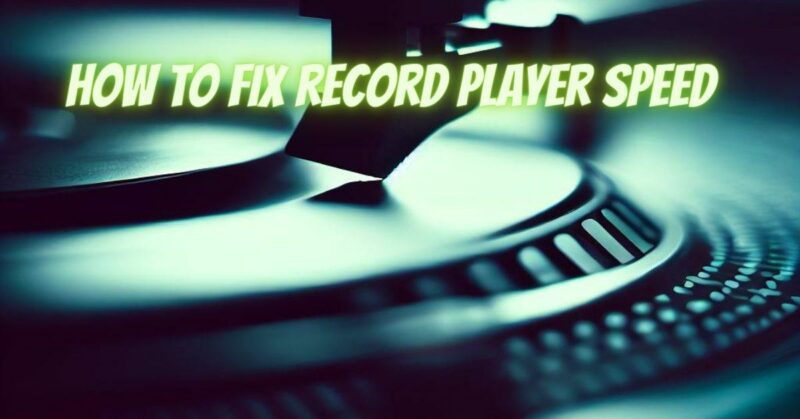Maintaining accurate and consistent speed is crucial for optimal audio playback on a record player. However, speed issues can sometimes arise, resulting in records playing too fast or too slow. In this article, we’ll explore common causes of record player speed problems and provide troubleshooting steps to help you fix them and restore proper rotation speed.
- Check the Belt: Many record players use a belt drive system to rotate the platter. Over time, the belt can stretch or become worn, leading to speed irregularities. To fix this issue, you may need to replace the belt. Refer to your turntable’s manual or consult the manufacturer’s guidelines for instructions on how to properly replace the belt.
- Verify the Motor: The motor is another critical component that affects turntable speed. Ensure that the motor is functioning correctly by checking for any signs of damage or malfunction. If the motor is faulty, it may need to be repaired or replaced. Contact a professional technician for assistance if necessary.
- Clean the Platter and Spindle: Dirt, dust, or debris on the platter or spindle can interfere with the rotation speed. Regularly clean these components using a soft cloth or a gentle cleaning solution recommended by the turntable manufacturer. Ensure that the platter spins freely without any obstructions.
- Lubricate Moving Parts: In some cases, insufficient lubrication can cause speed inconsistencies. Check the turntable’s manual for guidance on which parts require lubrication and use a suitable lubricant to ensure smooth movement. Be cautious not to over-lubricate, as excessive lubrication can lead to other issues.
- Check the Stylus Pressure: Incorrect stylus pressure can affect the speed and tracking of the record. Use a tracking force gauge to measure the stylus pressure and adjust it to the manufacturer’s recommended specifications. Incorrect tracking force can cause speed variations and damage the records.
- Verify Power Supply: Inconsistent power supply can impact the turntable’s speed. Ensure that the turntable is plugged into a stable power source, free from voltage fluctuations. Avoid using power outlets shared by other high-power devices that could cause interference.
- Professional Calibration: If the above troubleshooting steps do not resolve the speed issue, it may be necessary to seek professional assistance. A qualified technician can diagnose and calibrate the turntable’s internal components to restore proper speed.
Conclusion:
Maintaining accurate speed is essential for an enjoyable record player experience. By following the troubleshooting steps outlined above, you can identify and address common causes of speed problems. Regular maintenance, proper cleaning, and adherence to manufacturer’s guidelines are key to ensuring consistent rotation speed. Remember, if you’re unsure or encounter persistent issues, it’s always recommended to seek professional help. With a well-calibrated and properly functioning turntable, you can once again enjoy your vinyl collection with the correct speed and fidelity it deserves.

